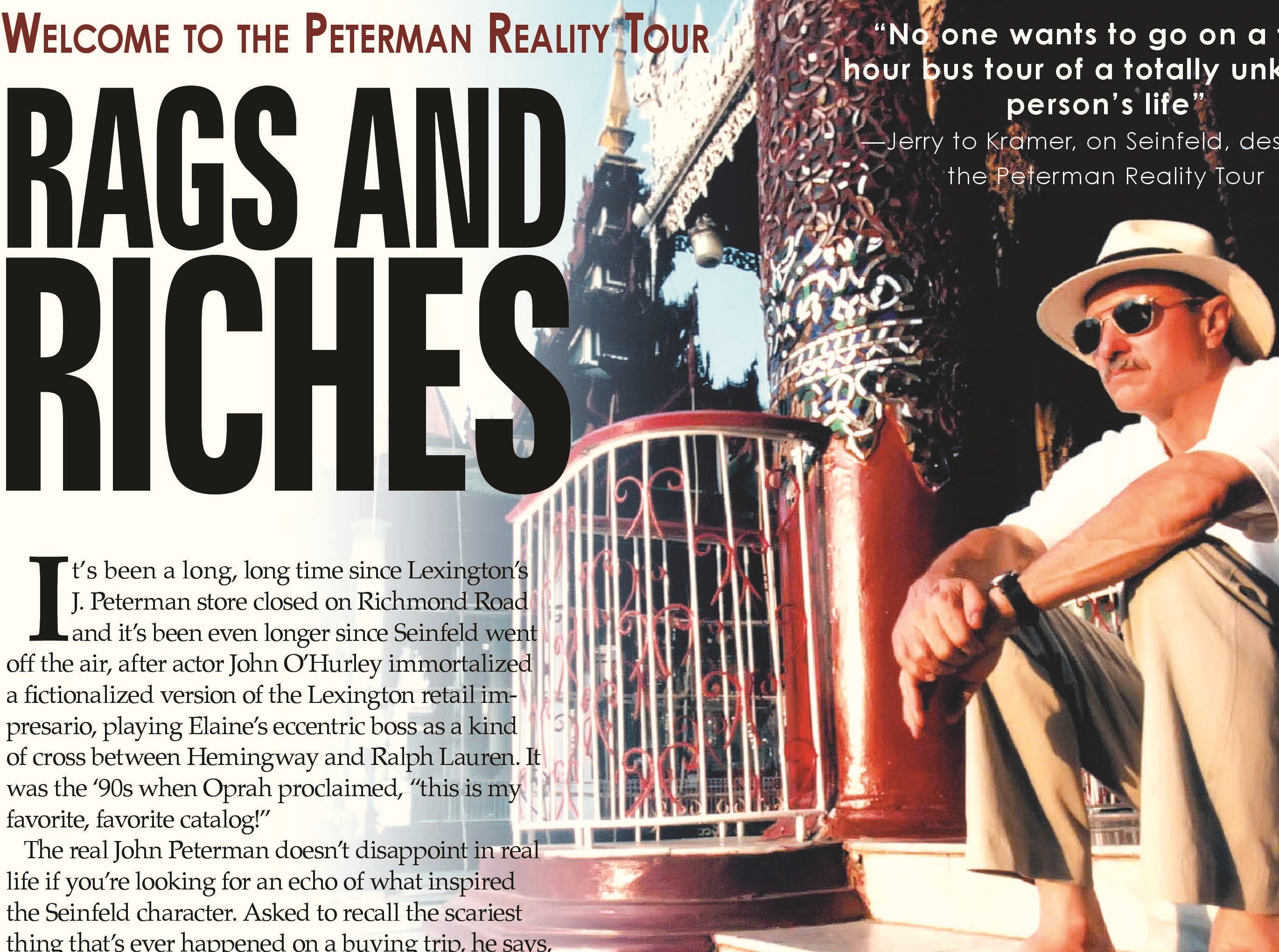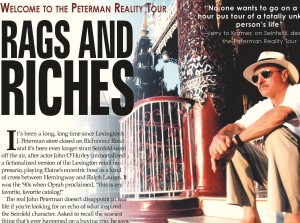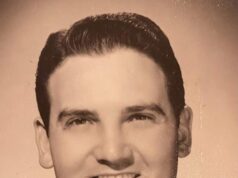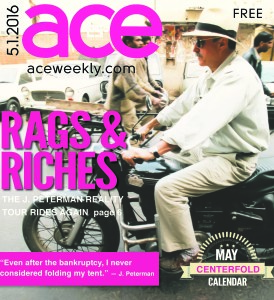

“No one wants to go on a three hour bus tour of a totally unknown person’s life”
—Jerry to Kramer, on Seinfeld, describing the Peterman Reality Tour
It’s been a long, long time since Lexington’s J. Peterman store closed on Richmond Road and it’s been even longer since Seinfeld went off the air, after actor John O’Hurley immortalized a fictionalized version of the Lexington retail impresario, playing Elaine’s eccentric boss as a kind of cross between Hemingway and Ralph Lauren. It was the 90s when Oprah proclaimed, “this is my favorite, favorite catalog!”
The real John Peterman doesn’t disappoint in real life if you’re looking for an echo of what inspired the Seinfeld character. Asked to recall the scariest thing that’s ever happened on a buying trip, he says, “Leaving Lima, Peru on Delta jet bound for Atlanta, approaching takeoff speed, pilot reverses engine, stands on brakes. We skid to a halt yards before the end of the runway. Ten tires had blown. Best part was that they put us up in a great hotel that night.”
The success of the current J. Peterman Kickstarter campaign (just south of $70k at press) suggests that longtime fans fondly recall the 90s heights and that new fans are climbing aboard, as they crowdfund a mod flapper dress, a motorcycle jacket, and an item the real Peterman resisted for years, the urban sombrero (heretofore existing only as a Seinfeld plot point). The campaign wraps up in May, and the goal is set at $500,000. As is true of all Kickstarter projects, “if a project isn’t successfully funded, no one pays anything.” The premiums don’t have to be disbursed unless the goal is met ($8,600. gets you a buying trip with Peterman himself if you’ll spring for the airfare) — so, win or lose, the once infamous catalog company has achieved a free media blitz that would make Jeff Bezos blush with schoolgirl envy.
Kickstarter seemed a logical choice for the funding of a potential retail resurrection, as Peterman has long candidly admitted, he was never much of a hit with traditional financiers anyway (a fact that is good-naturedly satirized in the Kickstarter video). Expanding too quickly from successful catalog operations to include 15 brick and mortar stores was widely cited as a factor in the failure of the first iteration of the brand. When the company went bankrupt in 1999, he briefly lost the rights to his brand and his name when it was purchased by the Paul Harris company. Peterman later bought the name back after Paul Harris went under — approaching well-capitalized friends like O’Hurley to invest. It has been an online retail company since.
He’s frank about why he felt the need for Kickstarter. “For one reason or another, I haven’t been as involved in the business in the past three or four years as I should have been. During that time, the company almost slipped into mediocrity. That’s losing your edge.”
The Petermans have been in Lexington nearly 40 years. John and wife Audrey are known as much for their status as community-minded neighbors and devoted grandparents as they are retail tycoons. (Their Easter table, set with Peterman plates, glasses, and furniture, is a holiday wonder on Facebook.) If you’re shopping in Lexington, you’re likely to run into Peterman himself at “Fresh Market, Critchfield, Liquor Barn.” Daughter Robyn Peterman Zahn is a popular writer and former actress. And if you’ve often thought “hey that guy in the carpool lane looks just like actor Steve Zahn,” it’s because it probably is Steve Zahn. He’s married to Robyn. The two are longtime supporters of Lexington’s theatre scene, and have been known to produce a show or two.
The internet has been littered with dozens of “Peterman is back!” stories since the 1999 bankruptcy. He says, “Even after the bankruptcy, I never considered folding my tent…I’ve had plenty of bad moments but have never considered not recovering.”
Next year will be the 30th anniversary of the first duster sold, the coat that sparked the birth of the J. Peterman company. Asked how he will commemorate the milestone, he says, “I’m not much into celebrations, however I do pay attention to my wedding anniversary or my wife’s birthday.”
The former Pittsburgh Pirates farm teamer got the wheels turning in 1987 with the first sale of a horseman’s duster he’d discovered in Jackson Hole, Wyoming.
He famously founded the company with $500 and a $20,000 unsecured loan. The iconic drawings that are the hallmark of “The Owner’s Manual?” He explains, “We couldn’t afford photography so we used art.”
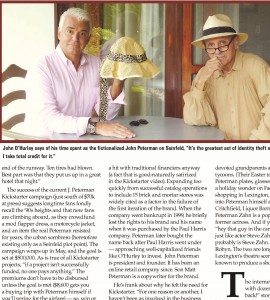


He and his friend, the late Don Staley (who would go on to write the famous copy), placed an ad in the Lexington paper. They sold one duster, but their instincts told them they could sell more.
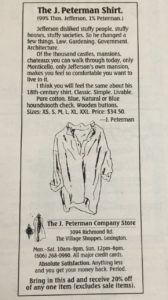


The strategy began to pay off when an ad they ran in The New Yorker sold more than 50 coats.
But it was still a shell game, always just one step ahead of purchasing the inventory and paying the printer to get the catalogs out to the consumers. Their office shared a building with another iconic Kentucky brand, Hall’s Beer Cheese (Peterman then worked in food/marketing consultancy). He recalls, “In the early days I had been fired from a job so I did what you do when you don’t have a job, I became a consultant to make some money. And, because I’m an entrepreneur, I bought half of Hall’s beer cheese, and I started J. Peterman upstairs.”
Beer cheese downstairs, horseman’s dusters upstairs. Hall’s eventually sold, but the dusters endured.
The business came to life with a handful of items in the iconic Owner’s Manual. The six words Peterman used to sum up the business — “unique,” “authentic,” “romantic,” “journey,” “wondrous,” and “excellent” — could be ascribed to almost any item in the catalog. He says today, “These are the words. They are the reason we’re going Kickstarter, to get back to using these words.”
His curatorial style / shopping / buying philosophy is simple, “I put myself in circumstances where I think there are a lot of interesting things, but if I see a new idea I’ll know it.”
At its height, revenue soared to $75 million, perhaps growing too fast — without a sustainable team in place that entirely understood the different challenges posed by brick and mortars versus catalog commerce.
At last Spring’s Emerge conference in Lexington, Peterman told a group of young entrepreneurs that he’d initially underestimated the impact of the internet, and that he’d spent “a great deal more time thinking about how retail can work, and should work, on the Internet.”
He elaborates on that today, adding, “Retail shopping should be an experience, not a ‘checkout process.’”
Now, he says, “I’m an old soul (literally and figuratively). I believe in the handwritten letter, the pocket watch, and the face to face. I think Churchill knew a thing or two. I also own a cell phone and I am fully aware the internet is real. I’m also too concerned with remaining relevant to disregard the ways of our technological world. My point? I’m no dinosaur waxing philosophical about what it was like when I grew up, walking uphill, backwards, in thirty feet of snow. Many of our daily functions can be achieved from behind a keyboard. You can date, buy groceries, and even go to college online. This is not new news. Let’s move on.”
Will millennials embrace that?
Peterman’s core customers in the 90s were 35 to 55 year olds. Those customers would now be 55 to 75, so a new generation will have to embrace the brand — a generation of digital natives who probably don’t believe in the pocket watch and the handwritten letter.
He says, “[They’re] not really different — same hopes, desires, curiosity, and appreciation – they just don’t realize it yet.”
The J. Peterman business really came to life with a duster and a New Yorker ad, followed by the iconic Owner’s Manual. The rumor then was that print was already dead. From the vantage point of 30 years in, does Peterman believe print is finally dead?
“No, print is not dead,” he says. “Everything goes in cycles. Today’s world is made up of 140 character sound bites. Like the fashion world, everything goes around in a circle. You just have to stay in the game.”
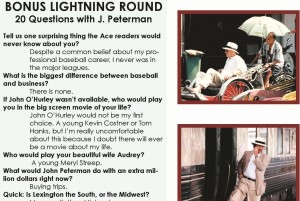

Tell us one surprising thing the Ace readers would never know about you?
Despite a common belief about my professional baseball career, I never was in the major leagues.
What is the biggest difference between Baseball and Business?
There is none.
If John O’Hurley wasn’t available, who would play you in the big screen movie of your life?
John O’Hurley would not be my first choice. A young Kevin Costner or Tom Hanks, but I’m really uncomfortable about this because I doubt there will ever be a movie about my life.
[But if there were…] Who would play your beautiful wife Audrey?
A young Meryl Streep.
What would John Peterman do with an extra million dollars right now?
Buying trips.
Quick: Is Lexington the South, or the Midwest?
More south than Midwest.
Name five things in your refrigerator right now:
Celery, carrots, chicken stock, milk, marinated herring.
Name five things in your top right desk drawer right now:
Once something goes into a drawer it’s gone forever.
All-time favorite movie scene?
Normandy D-Day landing scene from Saving Private Ryan.
Your greatest extravagance?
I’m not extravagant.
What book is on your nightstand right now?
Don’t read in bed, but in my den, it’s a bistro cookbook by Patricia Wells.
Best piece of advice ever given to you?
“If you stop moving, they can step on you.”
In what ways does Kentucky Kick Ass?
Beauty.
Predict the next Retail Trend that will explode in the Bluegrass, taking Lexington by storm, five years from now.
No idea. Perhaps it’s the fact that everything is so efficient and fast – that all of a sudden people will wake up and realize life has passed them by – and they never took the time to live it.
If you had to win your wife Audrey’s affections with a night of Karaoke, what song would you sing to best express your love for her?
“Don’t you know?” – Della Reese
What’s the nicest thing anyone’s said to you about J Peterman?
“I love what you do.”
What is the meanest thing anyone has said about it (that you know of)?
When someone says something mean, that’s more important to me – that’s something that I can fix or learn from.
In exchange for, say, a cover story, would you be willing to bring back the J. Peterman jean jacket (since it got lost in an Ace office move circa 2003).
No. You were one of the very few buyers of this item.
This article also appears on pages 5-7 of the May 2016 print edition of Ace.
Subscribe to the Ace e-dition for Lexington news, arts, culture, and entertainment, delivered to your inbox every Thursday morning.
Photos courtesy J. Peterman:


